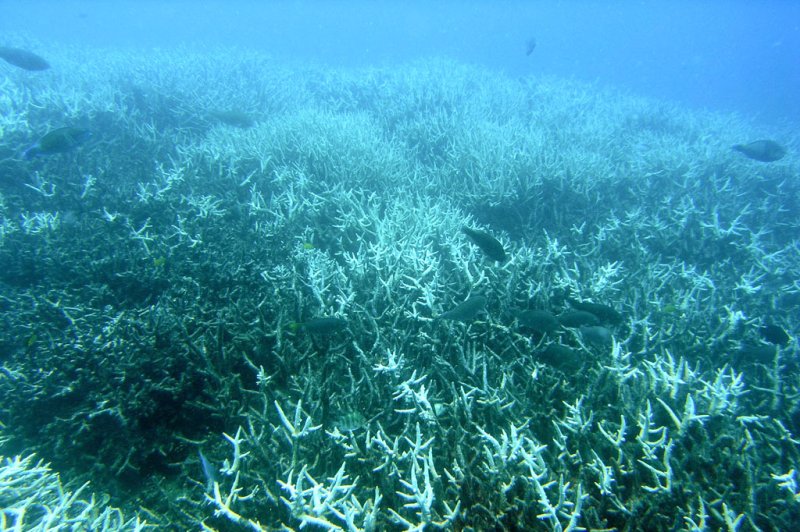Climate change and extreme weather have increased the risk of coral bleaching events across the tropics. Photo by
J. Roff/Wikimedia
Jan. 27 (UPI) -- Both tropical forests and coral reefs are facing the triple threat of climate change, extreme weather and pressures from human activities. This perfect storm of environmental damage could do irreparable harm to some of the most diverse ecosystems on the planet, according to a new study.
For the new study, researchers analyzed the ecological effects of extreme weather, including hurricanes, floods, heatwaves, droughts and fires, on 100 different tropical forest and coral reef locations.
"Tropical forests and coral reefs are very important for global biodiversity, so it is extremely worrying that they are increasingly affected by both climate disturbances and human activities," lead researcher Filipe França, an ecologist with Embrapa Amazônia Oriental in Brazil, said in a news release.
"Many local threats to tropical forests and coral reefs, such as deforestation, overfishing, and pollution, reduce the diversity and functioning of these ecosystems," França said. "This in turn can make them less able to withstand or recover from extreme weather. Our research highlights the extent of the damage which is being done to ecosystems and wildlife in the tropics by these interacting threats."
The new study, published Monday in the journal Philosophical Transactions of the Royal Society B, suggests extreme weather can destroy vegetation that provides food and habitat to vulnerable species.
"A range of post-hurricane ecological consequences have been recorded in tropical forests: the destruction of plants by these weather extremes affects the animals, birds and insects that rely on them for food and shelter," said Guadalupe Peralta, researcher at Canterbury University in New Zealand.
In places where habitats are already fragmented by human activities, including logging and agriculture, extreme weather can have especially deleterious impacts. In some places, hurricanes and other extreme weather events have reduced animal populations by half.
With temperatures rising and extreme droughts occurring more frequently, researchers suggest tropical forests are increasingly vulnerable to wildfire. The same conditions have increased the odds of coral bleaching events.
To reduce the threats to tropical biodiversity, authors of the new study suggest policy makers must combine global efforts to curb climate change with local efforts to conserve and protect vital ecosystems.
"To achieve successful climate-mitigation strategies, we need 'action-research' approaches that engage local people and institutions and respect the local needs and diverse socio-ecological conditions in the tropics," said Joice Ferreira from Embrapa Amazônia Oriental.















